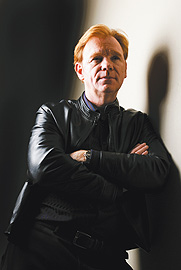HOME / 雑誌 / AERA English / デヴィッド・カルーソ インタビュー
デヴィッド・カルーソ インタビュー

| |

4月号掲載のデヴィッド・カルーソさんインタビューの一部をお届けします。音声ファイルのテキストもつけましたので、ご利用ください。
インタビュー 斉藤真紀子
|
|
|---|
Q: At the press conference, I thought it was very interesting that you told us about the body languages, even eye contact, very sensitive. Did you come up with all those details? Or did the director tell you to do?
A:
A lot of... well, law enforcement is about gaining control. When you are dealing with those types of perpetrators, and large part you are not dealing with criminals or people that are in need for the money, you are dealing with a sociopath, people that have real problems. They are not normal people. And it's very difficult to get a sociopath to be reasonable. So what you have to do if you can, is dominate them in the proceedings, dominate them emotionally, mentally and so on. In real law enforcement, if you are taken into custody, whether you committed or not, by the time you get to your interview, you are so frightened by the police, that you are willing to confess to anything, because it's their job to get your attention and soften you up, because if you are guilty, they have to... this is the opportunity to get you, and they are going to control you, if they can. So Horatio has very specific methods with his voice, with his body postures, with his eyes, with his sunglasses, all those things are by design, to kind of play games with you, in a way that will get you off balance, because I don't want to you be comfortable. I don't want you to have any power the scene, I want you to be confused, to be upset, or maybe frightened, because I have a chance to break you down. And I have to do that. Because, if you are sitting across the table from me, it means you are a dangerous person. We are not wrong about you. If you didn't commit this crime, you may have committed something else. I describe the show as shark stories. There is a shark in the water, I gotta get run, you know. That's real. Real things. These are all dangerous people on the show. We have various tools that we use to gain control of the situation.
Q:The show has much reality in it, but I thought sometimes Horatio was too cool, fashionable, and how he says things is very proper. I wonder if the real officers are like that. Or did you learn from somebody? Is there are model?
A:
Well, my observance, it's pretty interesting, because the real law enforcement people, and sometimes even in the military, they are very formalized and they are in great control of information. The key to all of this is collecting information, OK, and disseminating that information in the way that is to your advantage. So I am very sparing, I try to get them to cut as much dialogue as possible, I don't need dialogue, I trim the dialogue way way down. Because I don't want to share information till I'm ready. And it's very interesting if you are around the real investigators. They are very formal, they are not forthcoming, you don't know where to stand with them, and that's all by design. So he is not far off the mark, in terms of how he approaches the situation. I don't want you to know what he is thinking. I don't want you to know what his position is, because if I give away my position, that I am not at advantage. I don't want you to have the upper hand. Because I wanna have a chance to get control of the situation, if I do that. So it's technique. It's a tool, and so as I said, you know, I've been around the real investigators, they are similar. Some of them are not as eloquent, and maybe not as refined as Horatio is, but they are not forthcoming. They do not put themselves at disadvantage. They don't do that.
Q:Did you observe those people for this?
A:
To some degree. The character is amalgam of a number of people that I experienced.
|
|
|---|
|
|